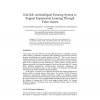3787 search results - page 20 / 758 » The Use of Agents Techniques on Intelligent Tutoring Systems |
ITS
2004
Springer
14 years 2 months ago
2004
Springer
In this paper, we make a first effort to define requirements for knowledge representation (KR) in an ITS. The requirements concern all stages of an ITS’s life cycle (construction...
AIED
2009
Springer
14 years 1 months ago
2009
Springer
EAGLE (Electronic Assistant for Game-Based Learning Experiences) is an intelligent tutoring system that supports learning with video games. We describe how a flexible ontology-base...
ITS
1998
Springer
14 years 28 days ago
1998
Springer
Abstract: This article reports on the application of general cognitive measures to describe and order the knowledge base of radiological images, aimed at the teaching of visual con...
UMUAI
2008
13 years 8 months ago
2008
Abstract. Self-efficacy is an individual's belief about her ability to perform well in a given situation. Because selfefficacious students are effective learners, endowing int...
ITS
2010
Springer
14 years 21 days ago
2010
Springer
This study attempted to determine if it is possible to create an automatic affect detector using a combination of semantic and keystroke data. While the resulting models attained d...

